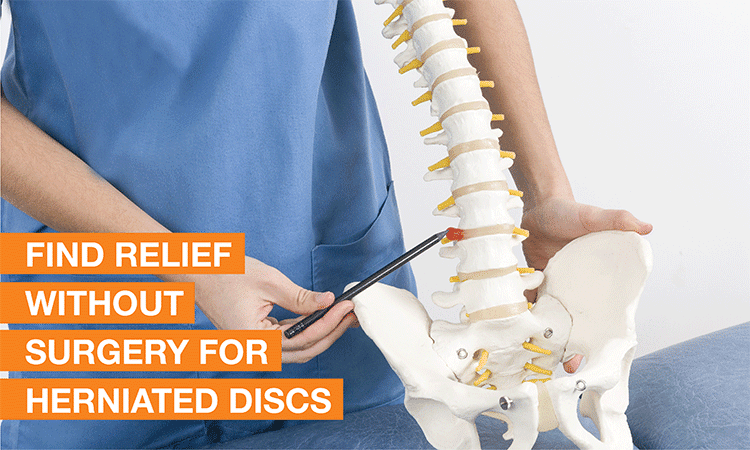Request Appointment
Enter your details and we will be in touch with you shortly;
Or call
8655885566
between 8 am and 8 pm.


Are you suffering from soreness and discomfort from a herniated disc? Dealing with this condition can be an excruciating experience, as it often leads to debilitating back pain and reduced mobility. However, surgery is not always the first or only option for treating this condition. In this blog, we will look at non-surgical disc herniation treatments that offer effective alternatives to manage herniated discs, help you with pain relief, regain mobility, and improve your overall quality of life. Whether you’re looking to avoid surgery or exploring additional options, read on to explore a range of non-surgical options that can make a real difference in your recovery journey and help you regain control of your life.
A herniated disc, also known as a slipped or ruptured disc, occurs when the soft inner core of a spinal disc protrudes through the outer layer. This can put pressure on nearby nerves, leading to pain, numbness, and weakness in the affected area. Common causes include age-related wear and tear, improper lifting techniques, and sudden trauma. It is essential to consult with a healthcare professional to accurately diagnose a herniated disc and determine the most suitable treatment plan for your specific condition.
Initially, a period of rest and modified activity may be recommended to allow the disc to heal naturally. This involves avoiding activities that exacerbate pain and adopting positions that relieve pressure on the spine.
Over-the-counter painkillers may provide temporary relief from pain and reduce inflammation. Your healthcare provider may also prescribe medications for more severe symptoms to manage pain and help you stay comfortable during the healing process.
Physical therapy is a cornerstone for treating herniated discs without surgery. Skilled healthcare professionals can design personalized treatment programs that focus on strengthening the surrounding muscles, improving flexibility, and promoting proper spinal alignment. Targeted medical movements, stretching routines, and manual therapy techniques help alleviate pain, enhance mobility, and prevent future injuries.
Applying heat or cold to the affected area can help reduce pain and inflammation associated with a herniated disc. Heat therapy, through the use of heating pads or warm compresses, increases blood flow, relaxes muscles, and promotes healing. Cold therapy, using ice packs or cold compresses, numbs the area, reduces swelling, and provides relief.
Traction therapy involves gentle stretching of the spine to alleviate pressure on the herniated disc and promote realignment. This can be done manually or using mechanical devices under the guidance of a trained healthcare professional. Traction therapy aims to reduce pain, improve spinal alignment, and promote the retraction of the herniated disc material.
Making certain lifestyle changes can play a vital role in managing bulging discs non-surgically. Maintaining proper posture, avoiding activities that strain the back, adopting ergonomic techniques at work, and engaging in regular low-impact movements can all contribute to pain reduction and overall spine health. Additionally, weight management and a balanced diet can alleviate stress on the spine and minimize the risk of further disc herniation.
By exploring these non-surgical options, one can effectively manage herniated discs and find relief from pain and discomfort. It’s important to note the effectiveness of non-surgical treatments for herniated discs may vary depending on the severity of your condition and individual factors. It is essential to consult with healthcare professionals who specialize in spine care to determine the most appropriate non-surgical options personalized to suit your specific needs.
Don’t let back problems hold you back. Explore non-surgical alternatives, talk to experts, and take the necessary steps toward a pain-free and active lifestyle. It’s time to take a holistic approach to your well-being by combining treatments, lifestyle changes, and self-care strategies to enhance your healing process and help you reclaim your quality of life.
Call 086558 85566 to book your first free consultation with the spine specialists at QI Sine today.
Visit our nearest clinic for your first consultation